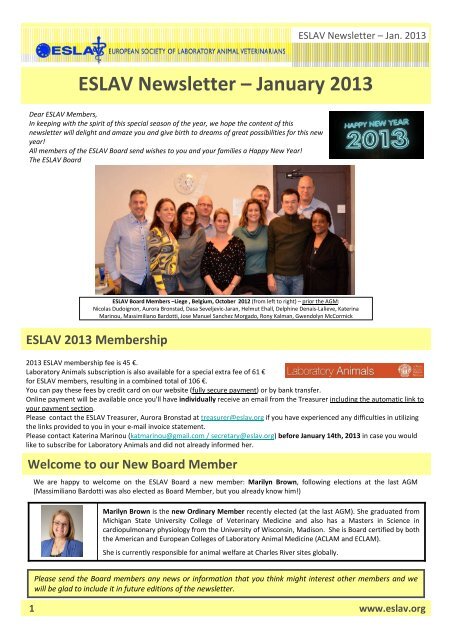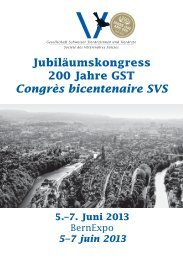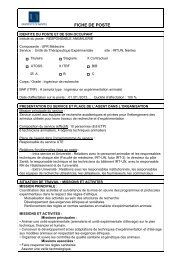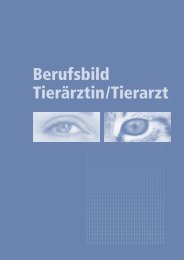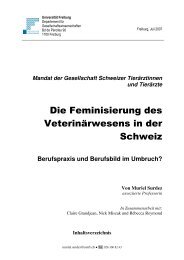ESLAV Newsletter Jan 2013 - SAVIR
ESLAV Newsletter Jan 2013 - SAVIR
ESLAV Newsletter Jan 2013 - SAVIR
Create successful ePaper yourself
Turn your PDF publications into a flip-book with our unique Google optimized e-Paper software.
<strong>ESLAV</strong> <strong>Newsletter</strong> – <strong>Jan</strong>. <strong>2013</strong><br />
<strong>ESLAV</strong> <strong>Newsletter</strong> – <strong>Jan</strong>uary <strong>2013</strong><br />
Dear <strong>ESLAV</strong> Members,<br />
In keeping with the spirit of this special season of the year, we hope the content of this<br />
newsletter will delight and amaze you and give birth to dreams of great possibilities for this new<br />
year!<br />
All members of the <strong>ESLAV</strong> Board send wishes to you and your families a Happy New Year!<br />
The <strong>ESLAV</strong> Board<br />
<strong>ESLAV</strong> Board Members –Liege , Belgium, October 2012 (from left to right) – prior the AGM:<br />
Nicolas Dudoignon, Aurora Bronstad, Dasa Seveljevic-Jaran, Helmut Ehall, Delphine Denais-Lalieve, Katerina<br />
Marinou, Massimiliano Bardotti, Jose Manuel Sanchez Morgado, Rony Kalman, Gwendolyn McCormick<br />
<strong>ESLAV</strong> <strong>2013</strong> Membership<br />
<strong>2013</strong> <strong>ESLAV</strong> membership fee is 45 €.<br />
Laboratory Animals subscription is also available for a special extra fee of 61 €<br />
for <strong>ESLAV</strong> members, resulting in a combined total of 106 €.<br />
You can pay these fees by credit card on our website (fully secure payment) or by bank transfer.<br />
Online payment will be available once you'll have individually receive an email from the Treasurer including the automatic link to<br />
your payment section.<br />
Please contact the <strong>ESLAV</strong> Treasurer, Aurora Bronstad at treasurer@eslav.org if you have experienced any difficulties in utilizing<br />
the links provided to you in your e-mail invoice statement.<br />
Please contact Katerina Marinou (katmarinou@gmail.com / secretary@eslav.org) before <strong>Jan</strong>uary 14th, <strong>2013</strong> in case you would<br />
like to subscribe for Laboratory Animals and did not already informed her.<br />
Welcome to our New Board Member<br />
We are happy to welcome on the <strong>ESLAV</strong> Board a new member: Marilyn Brown, following elections at the last AGM<br />
(Massimiliano Bardotti was also elected as Board Member, but you already know him!)<br />
Marilyn Brown is the new Ordinary Member recently elected (at the last AGM). She graduated from<br />
Michigan State University College of Veterinary Medicine and also has a Masters in Science in<br />
cardiopulmonary physiology from the University of Wisconsin, Madison. She is Board certified by both<br />
the American and European Colleges of Laboratory Animal Medicine (ACLAM and ECLAM).<br />
She is currently responsible for animal welfare at Charles River sites globally.<br />
Please send the Board members any news or information that you think might interest other members and we<br />
will be glad to include it in future editions of the newsletter.<br />
1<br />
www.eslav.org
<strong>ESLAV</strong> <strong>Newsletter</strong> – <strong>Jan</strong>. <strong>2013</strong><br />
New <strong>ESLAV</strong> Board Member honored by AALAS<br />
Dr. Marilyn J. Brown receives the 2012 AALAS Griffin Award<br />
Dr. Marilyn J. Brown, Charles River Corporate Vice President, Global Animal Welfare and new<br />
member of the <strong>ESLAV</strong> Board, received the 2012 AALAS Charles A. Griffin Award during the<br />
Opening Session of the 63rd Annual Meeting of the American Association for Laboratory<br />
Animal Science on November 4, 2012 in Minneapolis, Minnesota, USA.<br />
The Griffin Award is AALAS’ oldest and most prestigious accolade. The award is given<br />
annually in recognition of individuals who have demonstrated continuous ethical scientific<br />
and/or technological advancements in humane experimentation or improved animal care<br />
practices throughout their career.<br />
International Recognition of Laboratory Animal Technicians<br />
In 1999, AALAS’ Committee on Technician Awareness and Development created a national laboratory animal technician<br />
week to recognize laboratory animal technicians for their essential contributions as members of the research team. Because<br />
of its success, it was expanded in 2002 and renamed International Laboratory Animal Technician Week, allowing technicians<br />
from around the world to participate in the event.<br />
Since 2002, the International Council for Laboratory Animal Science (ICLAS) and AALAS have worked together to<br />
acknowledge technicians for their roles in the biomedical/biological research field around the world. Since that time,<br />
laboratory animal science organizations in Australia & New Zealand (ANZLAS), United States (AALAS), China (CALAS), Canada<br />
(CALAS-ACSAL), Brazil (COBEA), United Kingdom (IAT), Japan (JALAS) and India (LASA India) have held formal and informal<br />
events to recognize the contributions of laboratory animal technicians.<br />
In <strong>2013</strong>, the theme for this International recognition event will<br />
be “Technicians, the building blocks of research.” Some examples<br />
of what various organizations have done to recognize technicians<br />
in previous years can be found at the following link:<br />
http://www.aalas.org/resources/2012techweek.aspx.<br />
BioConference Live Meeting - LAS<br />
Laboratory Animal Science – February 13-14th, <strong>2013</strong><br />
The Veterinary Bioscience Institute and LabRoots, Inc. are thrilled to announce the two-day international Laboratory<br />
Animal Science (LAS) BioConference Live. This is the premier online-only conference focused on laboratory animal<br />
medicine. The theme of this conference is Animal Well being and Welfare Science with three tracks; housing, enrichment<br />
and pain/distress/pleasure. LAS BioConference Live will bring together scientists, veterinary technicians, veterinarians,<br />
technical support staff, IACUC administrators and support staff, as well as training and compliance personnel from around<br />
the world to learn about recent advances in the field of laboratory animal medicine. Never before has such a diverse group<br />
of experts been able to participate in one, groundbreaking conference. This conference offers an amazing opportunity as it<br />
is free to participants, and there will be no out-of-pocket expenses for travel. However, participants will still benefit from<br />
interacting with a global community of like-minded colleagues, without leaving the comfort of their office or home.<br />
Don’t forget to register:<br />
http://vshow.on24.com/vshow/BCL<strong>2013</strong>LAS/registration/2728<br />
2<br />
www.eslav.org
<strong>ESLAV</strong> <strong>Newsletter</strong> – <strong>Jan</strong>. <strong>2013</strong><br />
Speaking up on the Important Role Animals Play in Biomedical Research<br />
As animal rights and extremist groups continue to provide inaccurate information to the public and legislative bodies, it is<br />
important that someone stand up and tell the public what is true. It is the opinion of the public that greatly influences<br />
legislative bodies who in turn make laws that impact how and if the biomedical research community can continue to do<br />
research that lead to innovative methods of improving the lives of millions of people and animals around the world.<br />
The European Federation of Pharmaceutical Industries and Associations (EFPIA) has initiated a public campaign to create<br />
transparency and inform the public on Animal Testing Perspectives. One component of this initiative was the creation of a<br />
website/blog to facilitate dialogue with the public on the topic of animal use. A communications agency, ZN, will use various<br />
tactics (Twitter activation, Google advertisement, ATP newsletter) to drive traffic to the page and get as much engagement<br />
with the public as possible. You can log onto the website through the following link:<br />
http://animaltestingperspectives.org/animal-research-studies-in-plain-words/.<br />
Another site that also provides background on the positive contributions of the use of animals in research can be found at the<br />
following link: http://www.animalresearchforlife.eu/.<br />
EFPIA also invites you to share your opinions and join the debate on Twitter using the #EUanimalstudies hashtag and to<br />
disseminate the information to external contacts who might be interested.<br />
William Talman, MD, Professor of Neurology and Neuroscience at the University of Iowa has also<br />
written a very clear article directed at a very large segment of the public on the importance of<br />
animals as biomedical research models. His article is public accessible in a blog post in the Huffington<br />
Post. Take a look at it through the following link:<br />
http://www.huffingtonpost.com/william-t-talman-md/animal-testing-medicine_b_2250283.html<br />
Polls conducted in Italy earlier this year revealed that only about 37% of the Italian public<br />
supported the use of animals in research. The results of a more recent poll conducted in UK<br />
showed that there has also been a slight reduction in public support of use of animals in research<br />
in that country as well. (http://www.understandinganimalresearch.org.uk/)<br />
An alliance of professional organizations have taken a stance and issued a document to increase<br />
transparency and improve communication with the public about the importance of animal<br />
research. You can review this document through the following link:<br />
http://www/understandinganimalresearch.org.uk/assets/documen/78573611-F 6D3-F6D0-<br />
3D555C4B15E8AFAD/declaration-on-openn.pdf.<br />
After visiting these websites and reading the posted comments, if you feel inspired to take a more active role in speaking up<br />
about animal research, consider attending RedLab 13, a two-day communication and media training workshop that will be<br />
given by Foundation for Biomedical Research May 14-15, <strong>2013</strong> at the Gaylord Convention Center & National Harbor near<br />
Washington, D.C., USA. This total immersion experience promises to change the way you communicate for the rest of your<br />
career! Due to the team interactions that will be involved, there will be only 200 spaces available for this workshop. If this<br />
fits into your new year resolutions for <strong>2013</strong>, register right away!<br />
The workshop agenda and registration information can be found at:<br />
http://www.fbresearch.org/uploadedFiles/FbResearch/Content/Media_Center/RedLab/FBR%20RedLab13%20brochure.pdf<br />
3<br />
www.eslav.org
<strong>ESLAV</strong> <strong>Newsletter</strong> – <strong>Jan</strong>. <strong>2013</strong><br />
Strategies for Implementing New EU Directive 2010/63<br />
As part of the strategy to implement the EU Directive 2010/63, the European Commission established several expert<br />
working groups in 2011 and 2012 for the purpose of developing common frameworks for: 1) statistical reporting, 2)<br />
severity assessment and , 3) education and training requirements.<br />
All Member States and main stakeholder organizations were invited to nominate experts to participate in the work.<br />
Members of both <strong>ESLAV</strong> and ECLAM actively participated in these Expert Working Groups throughout the year.<br />
The Statistical Reporting WG met several times in 2011. <strong>ESLAV</strong>-ECLAM designated expert was Anne-Dominique Degryse.<br />
The outcome of these meetings was the adoption on 14/11/2012 of the Commission Implementing Decision establishing<br />
a common format for the submission of the information pursuant to Directive 2010/63/EU.<br />
You could find this document through the following link:<br />
http://eur-lex.europa.eu/LexUriServ/LexUriServ.do?uri=OJ:L:2012:320:0033:0050:EN:PDF<br />
The Education and Training Expert Working Group met 22-23 February 2012 and developed a consensus paper (still work<br />
in progress) which is available for review through the following link:<br />
http://ec.europa.eu/environment/chemicals/lab_animals/pdf/Education-Training%20Consensus.pdf. The principles of the<br />
framework of this consensus document were endorsed by the National Competent Authorities for the implementation of<br />
Directive 2010/63 EU at their meeting of 22-23 March 2012. <strong>ESLAV</strong> and ECLAM were represented by Ismene Dontas.<br />
The Severity Assessment Expert Working Group started its work in 2011 and held two meetings (Dec 2011 and May 2012)<br />
as well as discussions with Member States and received legal input from the Commission on the understanding of a<br />
severity framework, its components, participants, working tools and methods. <strong>ESLAV</strong>-ECLAM experts were Anne-<br />
Dominique Degryse and Hans Hedrich (for the meeting specifically dedicated to Genetically Altered animals). A final<br />
consensus document was endorsed by the National Competent Authorities for the implementation of Directive 2010/63<br />
EU during a meeting on 11-12 July 2012. The severity assessment consensus document can be viewed through the<br />
following link:<br />
http://ec.europa.eu/environment/chemicals/lab_animals/pdf/Consensus%20doc%20on%20severity%20assessment.pdf<br />
The meeting on GA animals resulted in the following consensus document:<br />
http://ec.europa.eu/environment/chemicals/lab_animals/pdf/Endorsed_consensus_doc.pdf<br />
If the proposed severity assessment process is implemented effectively, the animals and all personnel involved in their<br />
care and use will benefit from improved animal welfare and scientific validity and transparency. Good internal and<br />
external communication on the severity assessment process and on the application of the Three Rs will afford even wider<br />
benefits.<br />
The Commission has also established an Expert Working Group specifically on Information on Alternative Methods and<br />
the 3Rs Strategies. Nikos Kostomitsoupoulos was appointed as the <strong>ESLAV</strong> & ECLAM Expert on this EWG. The EWG held its<br />
first meeting in Brussels, Belgium on November 29-30, 2012.<br />
Please note that all these documents are guidance to assist the Member States and others affected by this Directive to<br />
arrive at a common understanding of the provisions contained in the Directive.<br />
And don’t forget to take a look at the<br />
Transposition Scoreboard!<br />
http://ec.europa.eu/environment/chemicals/lab<br />
_animals/transposition_en.htm<br />
4<br />
www.eslav.org
<strong>ESLAV</strong> <strong>Newsletter</strong> – <strong>Jan</strong>. <strong>2013</strong><br />
Results of <strong>ESLAV</strong> Boredom Busters Survey<br />
A survey was sent out to <strong>ESLAV</strong> membership during the summer of 2012 for the purpose of allowing you to give input on<br />
what should be done to make <strong>ESLAV</strong> a more dynamic organization. Here are the summarized results of what you said:<br />
You want to provide a service to <strong>ESLAV</strong>:<br />
• 36 % of the respondents would like to become <strong>ESLAV</strong> Board members<br />
• 24% of the respondents would like to become an National Representative<br />
• 61% of the respondents would like to serve on an Expert Working Group<br />
Your views on creation of an <strong>ESLAV</strong> Membership Directory included<br />
• 94% wanted access to the directory to be restricted to <strong>ESLAV</strong> members only<br />
• 88% did not want paper copies of the directory<br />
• 82% favor creating a new membership directory<br />
• 78% did not want pictures of members to be included in the directory<br />
• 72% wanted the directory to be linked through the <strong>ESLAV</strong> website<br />
• 57% wanted the directory to include work addresses, telephone and fax numbers<br />
Your views on the use of social media for professional networking<br />
• 60% use Linked’n for professional networking<br />
• 57% would actively participate in an <strong>ESLAV</strong> social media group if it were restricted to <strong>ESLAV</strong> members only<br />
• 36% do not use social media, prefer face-to-face communication<br />
• 15% use other media for professional networking<br />
• 6% use Facebook for professional networking<br />
Your thoughts on <strong>ESLAV</strong> Website<br />
• 64% visit the current website less than once/month<br />
• 34 % do not find much value in the current website<br />
• 54% have difficulty navigating around the current website<br />
• 79% have difficulty finding information on the website<br />
• 82% think the information on the current website is not up-to-date<br />
Things you want to see in a re-designed <strong>ESLAV</strong> website:<br />
97% Veterinary Educational Resources<br />
88% Links to <strong>ESLAV</strong> Meeting Information<br />
83% Statements of <strong>ESLAV</strong> mission, values, ethics<br />
79% Ethics Committee and Animal Welfare Resources<br />
79% Activities of National Representatives in responsible<br />
countries<br />
79% Links to archived copies of <strong>ESLAV</strong> newsletter and Briefing<br />
73% Membership information<br />
70% Links to relevant activities and events<br />
Comment: Would like links to veterinary education information<br />
Comment: Would like <strong>ESLAV</strong> to facilitate online education on specific topics<br />
67% Ability to pay <strong>ESLAV</strong> fees online through website<br />
67% Resources for National Representatives<br />
64% Job/Career Information<br />
52% ECLAM Information<br />
48% A searchable member directory on the website<br />
33% Information accessible to the public<br />
30% Information accessible to the press<br />
27% Mobile phone applicability<br />
97% of the respondents read Briefing and gave the following feedback on what they want in the future:<br />
Reviews of new books (94%), News on legislation (94%), A calendar of upcoming events (94%), Reports of <strong>ESLAV</strong> National<br />
Representatives (85%), Reports of scientific meetings (85%), Review articles (79%), Case reports (73%), Review articles of<br />
previously published articles in non-english language (70%), Editorials from <strong>ESLAV</strong> and LAVA Presidents (70%), Scientific peer<br />
review articles (45%), Editorials from other personalities (43%)<br />
And more important 33% of the respondents would like to write articles for publication in Briefing on the various topics<br />
(Training of Scientists, Setting up an Ethics Committee, Setting up a snake animal facility, Health Controls for Zebrafish,<br />
Health Controls for Mice, Health Controls for Snakes, Clinical Cases/ Case Reports, Infectious disease, Genetics, Animal<br />
Models in Cardiology, Housing Conditions and Refinement, General Care of Laboratory Animals, Gnotobiotics, Management<br />
of Laboratory Animal Flora, Risk Assessment for Animal Welfare)<br />
So, thanks for your input!!<br />
And for those who volunteer, we wait for your participation to Briefing! B<br />
5<br />
www.eslav.org
<strong>ESLAV</strong> <strong>Newsletter</strong> – <strong>Jan</strong>. <strong>2013</strong><br />
Workshops and Meetings!<br />
The American Biological Safety Association is sponsoring<br />
2nd International Biosafety & Biocontainment Symposium, February 2-6, <strong>2013</strong><br />
Hilton Alexandria Mark Center, Alexandria, Virginia, USA. http://arssymposium.absa.org/<br />
Principles & Practices of Biosafety, February 24- March 1, <strong>2013</strong>,<br />
Embassy Suites Orlando, Lake Buena Vista South, Orlando, Florida, USA. http://www.absa.org/eduppb.html<br />
Advanced Course in the Use of Swine in Biomedical Research<br />
The advanced training course (lectures + labs) using swine will be conducted at the<br />
Medical University of South Carolina, USA, Monday to Wednesday, February 4-6, <strong>2013</strong>.<br />
The course is applicable to veterinarians, technicians and investigators using porcine models.<br />
Registration is limited and the course can be personalized for attendees.<br />
For more detailed information email: swindlem@musc.edu or coxrd@musc.edu.<br />
Registration forms and the course outline will be sent upon request. The course at MUSC will only be held annually in<br />
February following this session. Individualized courses can be taught at your institution upon request.<br />
11th Transgenic Technology Meeting<br />
The purpose of this meeting is to foster communication and technology sharing, to enhance scientific research, to advance<br />
the field of animal transgenesis, particularly as it applies to useful experimental models in biology, medicine and<br />
biotechnology, representing the interests of scientists, technicians and graduate students working in the field of transgenic<br />
technologies.<br />
The meeting will be held in Guangzhou/Canton, P.R. China on 25-27 February <strong>2013</strong>.<br />
The meeting organizer is Prof. Ming Zhao (SMU).<br />
More detailed information on the meeting and registration can be found at the following website: www.tt<strong>2013</strong>.org<br />
The following series of courses will be presented by Fondazione Guido Bernardini in Milan in <strong>2013</strong>.<br />
More details for each course can be found at http://www.fondazioneguidobernardini.org.<br />
1. Cleansing and Decontamination: Best Practices in Washing, Disinfection and Sterilization in the Laboratory Animal Facility,<br />
February 6-8, <strong>2013</strong>, Milan.<br />
2. Organization and Procedures in the Modern Laboratory Animal Facility, March 19-22, <strong>2013</strong>, Milan.<br />
3. The Health Monitoring of Rodents and the Cage Level Environment in IVC Equipped Facilities, May 16-17, <strong>2013</strong>, Milan<br />
4. The Management of Genetically Modified Rodent Colonies, September 26-27, <strong>2013</strong>, Milan.<br />
5. Facility Planning, Logistics and Technological Solutions, November 14-15, <strong>2013</strong>, Milan.<br />
NJABR’s 3Rs Sharing Conference II:<br />
“The Power and Potential of Refinement and Reduction”<br />
This one-day meeting will be held on 27 February <strong>2013</strong> at the Palace at Somerset Park,<br />
Somerset, NJ, USA for the purpose of bringing together scientists from multiple disciplines<br />
to share precompetitive work that improves science by reducing, refining or replacing the<br />
use of animals; improves the predictive power of preclinical models; and instills a culture of examining existing preclinical<br />
models for improvements. This meeting will also include a poster session. If you are interested in attending this meeting,<br />
please visit the event website at: www.njabr.org or contact the event organizer, Annette McCabe at mccabe@njabr.org.<br />
6<br />
www.eslav.org
<strong>ESLAV</strong> <strong>Newsletter</strong> – <strong>Jan</strong>. <strong>2013</strong><br />
Workshops and Meetings!<br />
Joint <strong>2013</strong> IAT and LAVA Congress<br />
“Techs and Vets—together we can make a difference”<br />
This Congress will take place in the South of England on 12th-15th March, <strong>2013</strong>.<br />
It will focus on the implementation of the EU Directive into UK law and there will be a<br />
“Named Persons’ Workshop” held on the opening Tuesday, 12th March. This will concentrate<br />
on issues of the new Directive which affect the NACWO and NVS. There will also be papers,<br />
posters and workshops on Wednesday 13th March and Thursday 14th March, aimed at promoting the<br />
mutually respectful working relationship between animal care staff and veterinary surgeons. A Trade Exhibition Hall will also<br />
be an integral part of this Congress, providing attendees opportunities to view and compare all the latest innovations and to<br />
chat wit the major suppliers in our industry. Registration booking forms can be found at the IAT website:<br />
http://www.iat.org.uk/congress.html.<br />
The closing date for Congress bookings will be Sunday 24th February <strong>2013</strong>.<br />
12th FELASA-SECAL Congress, Barcelona, Spain, 10-13 June <strong>2013</strong><br />
“Animal research: Better Science from Fewer Animals”<br />
The Organizing Committee invites you come to this Congress which<br />
will be held at the International Convention Center of Barcelona (CCIB)<br />
on the Barcelona seafront.<br />
You have an opportunity to participate in 35 sessions, 9 workshops and one satellite workshop covering three areas: “Health,<br />
Welfare and Legal Issues,” “Animal Facility Management,” and “LAS Applied Research.” There will also be a large exhibition<br />
hall where you can talk with companies about their latest equipment, technology and services. A variety of Interesting social<br />
programs will also be held, giving you an opportunity to meet old colleagues and make new friends. Reduced registration<br />
fees will be available until 28 February <strong>2013</strong>.<br />
Please visit this website for information on submission of abstracts for posters and oral presentations, social events and<br />
registration information. http://www/felasa<strong>2013</strong>.eu/<br />
15-16 September <strong>2013</strong><br />
LAVA-<strong>ESLAV</strong>-ECLAM Joint Scientific Meeting<br />
Cambridge, UK.<br />
More information on programme will be available soon…<br />
ICLAS Regional Fellowship Training Program<br />
The European Regional Committee (ERC) of the International Council for<br />
Laboratory Animal Science (ICLAS) announces three training fellowship awards in<br />
laboratory animal science.<br />
These awards are available to individuals from European countries/areas in the process of<br />
developing modern standards of animal care and use. The objective of the fellowships will be<br />
to acquire new knowledge and/or technical competences in the care and use of laboratory animals.<br />
This can be achieved in one of the host institutions or in an institution proposed by the applicant.<br />
At least one fellowship will be awarded each year for each of the following levels listed below:<br />
Technician Level<br />
Animal Facility Manager/Animal Welfare Officer/Veterinarian Level<br />
Animal User, Scientist Level<br />
More information: http://iclas.org/committees/europe-regional-committee/regional-sponsorship-training-program<br />
Please send the Board members any news or information that you think might interest other members and we<br />
will be glad to include it in future editions of the newsletter.<br />
7<br />
www.eslav.org
<strong>ESLAV</strong> <strong>Newsletter</strong> – <strong>Jan</strong>. <strong>2013</strong><br />
Publications<br />
Switzerland’s Federal Veterinary Office has published its 2nd Animal Welfare Report.<br />
You can access the electronic version of the report via the following link:<br />
http://www.bvet.admin.ch/dokumentation/00327/02466/04107/index.html?lang=en<br />
Briefing, November 2012 (volume 16.2)<br />
http://europe.nxtbook.com/nxteu/eslav/briefing_201206/index.php<br />
Handbook of Laboratory Animal Management and Welfare,<br />
4th Edition, Sarah Wolfensohn, Maggie Loyd. ISBN: 978-0-470-65549-8,<br />
Available February <strong>2013</strong> from Wiley-Blackwell Publishers.<br />
This bestseller has been an essential book for all those working with laboratory animals<br />
since it was first published in 1994. This fourth edition retains all the classic features<br />
that have made it a must-have reference including emphasis on best practice in order<br />
to improve animal welfare. The contents have been thoroughly updated and reorganized<br />
to make sure it is a really practical book for day-to-day use in the laboratory. The first<br />
section of the book covers principles applicable to all species and technical staff working<br />
with animals in the laboratory. Later chapters focus on specific species or groups of species.<br />
New components of this edition includes: 1) Changes in European legislation and their<br />
impact on national legislation; 2) Recommendations for the education and training of those<br />
carrying out animal experiments across Europe; 3) New chapters on ethical considerations<br />
and balancing animal welfare and science; 4)New information on environmental enrichment<br />
for laboratory animals; and 5) Advancements in anesthesia and analgesia and techniques.<br />
The New <strong>ESLAV</strong> Board (2012-<strong>2013</strong>)<br />
President<br />
President-Elect<br />
Honorary Secretary<br />
Honorary Treasurer<br />
Ordinary Board Members<br />
National Representative & New Emerging Countries Coordinator<br />
AAALAC Board of Trustees Representative<br />
ECLAM Council Liaison<br />
LAVA Council Liaison<br />
Delphine Denais-Lalieve<br />
Nicolas Dudoignon<br />
Katerina Marinou<br />
Aurora Bronstad<br />
Massimiliano Bardotti<br />
Marilyn J. Brown<br />
Gwendolyn Y. McCormick<br />
Jose Sanchez-Morgado<br />
Dasa Seveljevic-Jaran<br />
Rikke Westh Thon<br />
Dasa Seveljevic-Jaran<br />
Anne-Dominique Degryse<br />
Rony Kalman<br />
Anja Petrie<br />
8<br />
www.eslav.org


